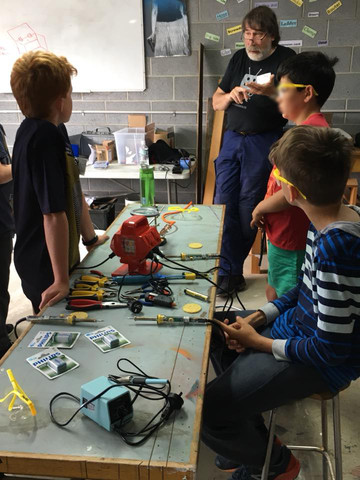Workshops
Some of our workshopsPermalink
A core objective of Hobart Hackerspace Inc. is to promote technical innovation in the wider community, as such we sometimes run workshops and public events. We can also arrange special demonstrations and instruction for students of all ages and skill levels.
Here are a sample of some of the workshops that have been run in the past, and may run again in the future. We are always interested in hearing your ideas for workshop topics. Especially if you are able to teach one for us!
Squishy Circuits – BeginnerPermalink
A conductive and non-conductive play-doh is used in place of wires to give children and the young at heart a hands on and fun way of making basic circuits. Connect a power source and watch lights flicker and motors turn. Play with different electrodes to turn the doh in to a battery and inadvertently learn some new things about analogue electronics in the process.
Introduction to Electronics – BeginnerPermalink
Taught by several of our most experienced members, this course covers all the basics of electronics. Calculating voltages and currents, Ohms law, what different components do and how they function. By the end of this workshop series you should be able to comfortably design and build a simple circuit, and have the basic skills to troubleshoot faulty equipment.
Arduino – ModeratePermalink
One “must have” in the electronics experimenters world is an Arduino. These little AT family micro-controller development boards are a stepping stone towards hardware development and digital electronics. We also have a few ARM development boards in the form of mBeds and other even more basic boards, so you can work your way up to designing and building your own computer based controllers
PIC – Moderate to AdvancedPermalink
Our PIC workshop is the entry point for people who want to learn about board design. It is assumed participants know a little about electronics and programming so our PIC workshop looks at designing a circuit, drawing it up using PCB design software, isolation routing the board using the 3-axis Mill, soldering components and then programming it to do what you designed it to do. We can do a more introductory version where the circuit has been designed for you so you can get to the fun parts quicker or we can work with you to design something to suit your own needs.
3D CAD – BeginnerPermalink
Using FreeCAD Primitives and Boolean Operations (don’t worry, we’ll explain this), you can learn enough to be able to design simple 3D Objects and prepare them for the CNC Mill or 3D printer. Once you have got these basics covered, you’ll be surprised how easy it is.
CNC Mill – ModeratePermalink
Probably our most complicated piece of equipment is the CNC Mill. To operate this you need to understand the principles of how the tools cut, how to calculate speeds, how to prepare tool paths in CAM (using CamBam) and how to set up and operate the mill itself. This is a workshop series of 4 evenings.
Soldering – BeginnerPermalink
Soldered joints are fundamental to electronics, but soldering is a technique
that frightens some. But it’s a simple skill when you know it.
Our fun workshops give people of all ages the opportunity
to learn this skill and produce reliable wiring and printer circuit
assemblies.

Kids in a soldering workshop
Other WorkshopsPermalink
Our members have a huge range of skills and are all too willing to share what they know. We regularly host workshops on other topics such as the operation and maintenance of machinery, to electronic art, virtual reality and gaming, and other fun things people dream up along the way.